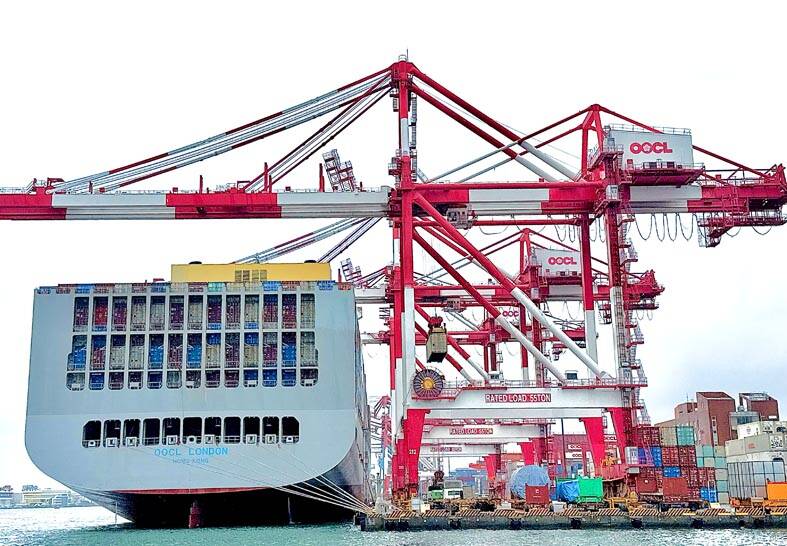Export orders last month expanded 25.1 percent year-on-year to US$69.37 billion, the ninth straight month of double-digit percentage growth and the second-highest for a single month, driven by strong demand in the artificial intelligence (AI), high-performance computing and cloud service industries, the Ministry of Economic Affairs said yesterday.
Last month’s export orders — an indicator of product and component shipments to overseas markets over the following one to three months — decreased 1.2 percent from the previous month, but were still within the ministry’s estimate of US$68.6 billion to US$70.6 billion.
In the first 10 months of the year, export orders grew 22.6 percent to US$593.74 billion, the largest for the period, the ministry said.

Photo: CNA
Export orders this month are projected to reach US$66.7 billion to US$68.7 billion, or a year-on-year increase of 27.6 percent to 31.4 percent, it said.
Order momentum is expected to remain strong through the end of this year, supported by robust demand for information and communications technology products, and electronic components, Department of Statistics Director-General Huang Wei-jie (黃偉傑) said.
Export orders for the whole year could hit a new high, surpassing US$674.1 billion in 2021, if orders this month and next month average US$40.2 billion — a scenario that is highly possible, Huang said.
It is also highly likely that the annual total could exceed US$700 billion if orders this month and next month average US$53.2 billion, he added.
Ministry data showed export orders for electronic components last month surged 35.9 percent year-on-year, as AI and emerging technologies continued to drive demand for chip production, design and packaging services, while orders for information and communications technology products rose 28.4 percent on the back of strong momentum in server and Internet communications businesses.
Machinery orders were also 16 percent higher than a year earlier, driven by increased demand for semiconductor production equipment, the ministry said.
Weakness persisted in some traditional industries, with export orders for plastic and rubber products falling by 9.8 percent, base metals dropping by 10 percent due to US tariffs and oversupply from China, the ministry added.
Chemical product orders rebounded, rising 4.4 percent, it said.

Sweeping policy changes under US Secretary of Health and Human Services Robert F. Kennedy Jr are having a chilling effect on vaccine makers as anti-vaccine rhetoric has turned into concrete changes in inoculation schedules and recommendations, investors and executives said. The administration of US President Donald Trump has in the past year upended vaccine recommendations, with the country last month ending its longstanding guidance that all children receive inoculations against flu, hepatitis A and other diseases. The unprecedented changes have led to diminished vaccine usage, hurt the investment case for some biotechs, and created a drag that would likely dent revenues and

Global semiconductor stocks advanced yesterday, as comments by Nvidia Corp chief executive officer Jensen Huang (黃仁勳) at Davos, Switzerland, helped reinforce investor enthusiasm for artificial intelligence (AI). Samsung Electronics Co gained as much as 5 percent to an all-time high, helping drive South Korea’s benchmark KOSPI above 5,000 for the first time. That came after the Philadelphia Semiconductor Index rose more than 3 percent to a fresh record on Wednesday, with a boost from Nvidia. The gains came amid broad risk-on trade after US President Donald Trump withdrew his threat of tariffs on some European nations over backing for Greenland. Huang further

Nvidia Corp’s GB300 platform is expected to account for 70 to 80 percent of global artificial intelligence (AI) server rack shipments this year, while adoption of its next-generation Vera Rubin 200 platform is to gradually gain momentum after the third quarter of the year, TrendForce Corp (集邦科技) said. Servers based on Nvidia’s GB300 chips entered mass production last quarter and they are expected to become the mainstay models for Taiwanese server manufacturers this year, Trendforce analyst Frank Kung (龔明德) said in an interview. This year is expected to be a breakout year for AI servers based on a variety of chips, as

HSBC Bank Taiwan Ltd (匯豐台灣商銀) and the Taiwan High Prosecutors Office recently signed a memorandum of understanding (MOU) to enhance cooperation on the suspicious transaction analysis mechanism. This landmark agreement makes HSBC the first foreign bank in Taiwan to establish such a partnership with the High Prosecutors Office, underscoring its commitment to active anti-fraud initiatives, financial inclusion, and the “Treating Customers Fairly” principle. Through this deep public-private collaboration, both parties aim to co-create a secure financial ecosystem via early warning detection and precise fraud prevention technologies. At the signing ceremony, HSBC Taiwan CEO and head of banking Adam Chen (陳志堅)